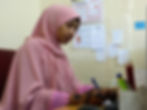OUR RESPONSE
Realising the potential of SASA’s reach and impact within the Somali community of the Western Cape, ALPS formed a mutually beneficial partnership with the organisation. SASA provides the critical on-the-ground knowledge, experience, and networks necessary to effectively identify and respond to community needs, while ALPS provides the essential resource mobilisation, project management and implementation skills for getting a project funded and off the ground.
2018 was an exciting year for the BRRC project. During the second half of the year, ALPS supported the opening of a SASA office in Pretoria West, hired and equipped new staff members, and expanded all resilience-building activities to serve refugee and migrant communities in Gauteng. ALPS continues to work with the SASA Pretoria team to build SASA’s organisational capacity and expand the reach of our services to vulnerable communities.
Together, we prioritise the strengthening of existing protection mechanisms and education initiatives, providing the following services for Somali communities in Western Cape and Gauteng:
-
English language classes;
-
Computer courses;
-
Women’s workshops;
-
Self-reliance workshops;
-
Community dialogues;
-
Youth soccer events;
-
Youth afterschool programmes;
-
Assistance to xenophobic violence victims;
-
Community advocacy; and
-
Referrals to services provided by the government and other NGOs.
PROJECT INFO
Dates: 2016 - 2021
Funder: The United States Bureau of Population, Refugees, and Migrants
Partner: Somali Association of South Africa (SASA)
PROJECT GALLERY



Building Resilient Refugee Communities (BRRC) Project
Since 2016, ALPS Resilience has worked in partnership with the Somali Association of South Africa (SASA) to promote integration and increase self-reliance amongst Somali refugees and asylum seekers living in the Western Cape. Over the past three years, with support from the United States Bureau of Population, Refugees and Migration (PRM), ALPS has successfully applied a community-based approach to deliver classes, referrals, and workshops to over 6000 beneficiaries a year.
THE CHALLENGE
Across the globe, it is estimated that 60% of refugees and asylum seekers now live in cities instead of camps. In South Africa, the vast majority of refugees and asylum seekers live in the major metropolitan areas of Cape Town, Johannesburg, and Pretoria. While cities allow refugees and asylum seekers to find work and rebuild their lives, rapid urbanisation makes it difficult to ensure protection and access to services for this vulnerable population.
In South Africa, we do not have a clear, holistic integration policy for refugees and asylum seekers. This lack of clear policy means that host communities are not adequately prepared for the influx of migrants, often leading to discrimination and hostility. Moreover, without assistance and support from government, migrants from all backgrounds find it difficult to learn English, settle into a home, find work and access the basic rights afforded to them in the Constitution.
